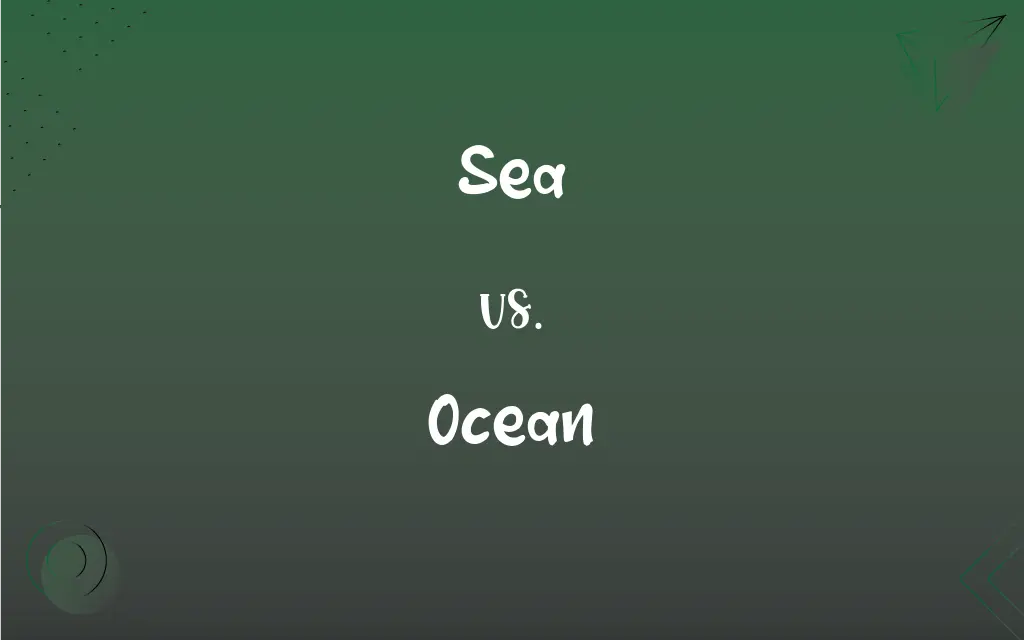Sea vs. Ocean: What's the Difference?
Edited by Aimie Carlson || By Harlon Moss || Updated on October 5, 2023
Oceans are vast, deep bodies of saltwater, covering larger areas than seas, which are smaller, partially enclosed by land.

Key Differences
Seas are smaller bodies of saltwater, sometimes partially enclosed by land, often acting as a crucial resource for nearby coastal communities. Oceans, on the other hand, are expansive bodies of saltwater that stretch across much larger areas, affecting global climate and weather patterns significantly. Neither is a self-contained entity; both seas and oceans contribute to the earth’s singular, interconnected global ocean.
Seas often showcase a variety of characteristics that distinguish them from oceans, such as being shallower and experiencing more direct human impacts due to their proximity to land. Oceans, in contrast, delve into profound depths and host abyssal plains, trenches, and massive ecosystems that are frequently more isolated from human activities. The habitats and creatures found within seas and oceans are intriguingly diverse yet follow this general principle of depth and isolation variation.
Seas can play vital roles in human economies, offering fishing opportunities and providing routes for maritime trade and travel. Oceans, however, due to their vastness and depth, largely influence weather patterns, climate, and even the oxygen content of the entire planet. Both sea and ocean have a critical impact on human civilization, albeit often in different scopes and scales.
When observing seas, one may note their relatively calmer waters, due to being partially enclosed by land, providing more stable conditions for smaller-scale navigation and exploration. In contrast, oceans, with their monstrous depths and expanses, can generate substantial weather systems and ocean currents, which can be both a marvel and a menace to navigators and explorers. Seas and oceans both embody the dynamic and sometimes tumultuous relationship between humanity and the hydrosphere.
Seas, in their geographical and geological aspects, may be encircled partially by land, creating distinct environmental and climatic conditions. Oceans, enveloping large swaths of the Earth’s surface, interconnect with each other, forming a gigantic, planet-spanning body of water. In essence, while seas can be seen as regionally significant bodies of water, oceans are the colossal reservoirs that interlink to form the Earth’s global ocean.
ADVERTISEMENT
Comparison Chart
Size
Smaller, often partially enclosed by land
Larger, not enclosed by land
Depth
Generally shallower
Generally much deeper
Human Interaction
More directly influenced by human activities
Less directly impacted by localized human activities
Weather Influence
Tends to have a more localized impact on weather
Has a massive, often global impact on weather
Biological Diversity
Often high, but usually different from that of open oceans
Vast and varied, with species adapted to extreme depths
ADVERTISEMENT
Sea and Ocean Definitions
Sea
A sea sometimes signifies a vast lake containing saltwater, despite not being connected to the world's oceans.
The Caspian Sea, despite its name, is technically the world's largest lake.
Ocean
Oceans have a profound impact on the Earth's weather and climate systems.
The Atlantic Ocean’s currents play a crucial role in regulating global climates.
Sea
Seas are often characterized by their shallower depths compared to the expansive depths of the oceans.
The North Sea provides vital fishing grounds and has been pivotal in European maritime history.
Ocean
Oceans are crucial for global trade and transportation, providing maritime routes that connect continents.
The Atlantic Ocean is traversed by numerous shipping lanes that facilitate international trade.
Sea
A sea may serve as a crucial maritime route or boundary between different landmasses or nations.
The Red Sea is a critical waterway for ships navigating between the Mediterranean Sea and the Indian Ocean.
Ocean
Oceans are categorized into five main divisions based on geographical boundaries.
The Indian Ocean is situated between Africa, Asia, and the Indian subcontinent.
Sea
A sea is a smaller body of saltwater, often partially surrounded by land.
The Mediterranean Sea is surrounded by Europe, Asia, and Africa.
Ocean
An ocean is a vast, continuous body of saltwater that covers over 70% of the Earth's surface.
The Pacific Ocean is the largest ocean on Earth.
Sea
The sea can refer to a smaller subdivision of the ocean, with distinct ecological or geographic traits.
The Sargasso Sea is known for its floating seaweed and is situated in the Atlantic Ocean.
Ocean
Oceans support a rich biodiversity, including species that dwell in its deepest trenches.
The Mariana Trench in the Pacific Ocean is home to some of the most enigmatic deep-sea creatures.
Sea
The continuous body of salt water covering most of the earth's surface, especially this body regarded as a geophysical entity distinct from earth and sky.
Ocean
The entire body of salt water that covers more than 70 percent of the earth's surface.
Sea
A tract of water within an ocean.
Ocean
Abbr. Oc. or O. Any of the principal divisions of the ocean, including the Atlantic, Pacific, Indian, Arctic, and Southern Oceans.
Sea
A relatively large body of salt water completely or partially enclosed by land.
Ocean
A great expanse or amount
"that ocean of land which is Russia" (Henry A. Kissinger).
FAQs
What is the primary difference between a sea and an ocean?
Oceans are larger and deeper than seas.
Which is the largest ocean on Earth?
The Pacific Ocean is the largest.
How many oceans are there on Earth?
There are five oceans: Pacific, Atlantic, Indian, Southern, and Arctic.
Which is typically calmer, a sea or an ocean?
Seas are typically calmer due to being partially enclosed by land.
Are seas less salty than oceans?
Not necessarily, salinity can depend on various factors like proximity to freshwater sources or ice.
Can seas be found within an ocean?
Yes, for example, the Sargasso Sea is located within the Atlantic Ocean.
Is the Baltic Sea less salty than the open ocean?
Yes, the Baltic Sea is known for its brackish water.
Can an ocean be completely surrounded by land?
No, that would typically be referred to as a sea or a lake.
Is the Dead Sea actually a sea?
Yes, despite its lake-like characteristics, it is known as a sea.
Can seas have different salinity levels?
Yes, salinity in seas can vary widely.
Can seas be formed by tectonic activity?
Yes, tectonic activity can form sea basins.
Which is deeper, the Mediterranean Sea or the Atlantic Ocean?
The Atlantic Ocean is deeper.
Do oceans and seas support diverse ecosystems?
Yes, both host a wide array of life forms and ecosystems.
Which is the smallest ocean?
The Arctic Ocean is the smallest.
Are oceans crucial for climate control?
Yes, oceans play a vital role in global climate regulation.
Which is the busiest ocean for maritime trade?
The Atlantic Ocean is one of the busiest.
Are there seas without any coastlines?
Yes, such as the Sargasso Sea which is surrounded by ocean currents.
Is ocean water safe to drink?
No, ocean water is salty and requires desalination to be safe for drinking.
Which is typically deeper, a sea or an ocean?
Oceans are typically deeper.
Are seas important for weather patterns?
Yes, seas can influence local weather patterns.
About Author
Written by
Harlon MossHarlon is a seasoned quality moderator and accomplished content writer for Difference Wiki. An alumnus of the prestigious University of California, he earned his degree in Computer Science. Leveraging his academic background, Harlon brings a meticulous and informed perspective to his work, ensuring content accuracy and excellence.
Edited by
Aimie CarlsonAimie Carlson, holding a master's degree in English literature, is a fervent English language enthusiast. She lends her writing talents to Difference Wiki, a prominent website that specializes in comparisons, offering readers insightful analyses that both captivate and inform.































































